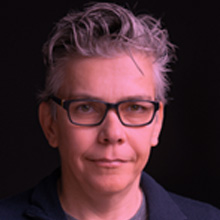No hay nada sacrosanto de lo cual no podamos reírnos
Voy a “dialocar” ahora con un humorista como yo, que también es coterráneo (somos cubanos), con alguien que también es de provincia (él de Sancti Spiritus y yo de Matanzas), que también se fue a residir a otro país (él a Suiza y yo a Chile). Alguien con quien me une la historia egipcia, porque él puede parecer un Faraón y yo una momia (por nuestras edades, digo). Se trata del amigo Ramsés Morales. “¿Sinuhé el egipcio él, quén?” (este es un chiste viejo mío, que supongo también se le habrá ocurrido a mil colegas más).
Pero ahora en serio, Ramsés Morales, nació en 1970 en Trinidad, Cuba. Sus obras han aparecido en algunos importantes diarios en todo el mundo. Ha expuesto en reconocidas galerías en Europa y Estados Unidos. En Cuba publicó algunos dibujos en el famoso semanario humorístico Dedeté (desde esa época lo sigo). Ha obtenido premios internacionales como el importante World Press Cartoon en 2019.
Soy gran admirador de su obra y una vez lo entrevisté para este mismo sitio hace unos cuantos años, por lo que me esforzaré para no repetir las preguntas…
PP: Gracias por aceptar que te vuelva entrevistar, querido Ramsés. Sé que trabajas mucho y regalarme tu tiempo, esfuerzo y neuronas lo valoro mucho.
RAMSÉS: Muchas gracias a ti, querido Pepe por entrevistar nuevamente a este outsider de la caricatura cubana.
PP: Bueno, si es así, yo también lo sería. Pero prefiero pensar que aunque nos hayamos nacionalizados suizo o chileno, es imposible dejar de ser cubanos porque ahí nos formamos. En fin, para comenzar, ¿puedes presentarte mejor tú mismo por si alguien de nuestros seguidores no te conocen? Quizás también diciéndonos cómo te gustaría que te recordaran en un futuro lejano.
RAMSÉS: Para comenzar puedo decirte que soy caricaturista desde que era niño. Una vez que descubrí la caricatura hojeando las páginas del New Yorker que coleccionaba mi abuelo, emigrante español. Esas revistas eran un placer para mí verlas cada vez que iba de vacaciones a su casa en Villa Clara. Creo que mi pasión por la línea pura comenzó desde ese momento. Eran dibujos tan sencillos y elegantes a la vez, con algún toque de gris por aquí o por allá… me fascinó tanto que comencé a copiarlos hasta que me abuelo me preguntó que era lo que deseaba ser y yo le contesté: publicar dibujos como esos en esa revista. Él me hizo un maravilloso regalo, una pluma esterbrook y un cuadernito de notas y me dijo: “Pues empieza desde ya”.
Por cómo me recuerde la gente, no me intereso mucho, eso vendrá de una manera o de otra. Más bien el ejercicio de la caricatura editorial que hago a diario, me ha hecho fijarme mucho más en el aquí ahora. Eso es lo que más me importa. Y que me paguen por mi trabajo.
PP: Ante todo, debemos agradecerle entonces a tu abuelo. Después te comento que es cierto que hay que preocuparse del aquí y ahora, pero los artistas también debemos pensar aunque sea un poquito en nuestro legado. Así que creo que aunque no lo pienses conscientemente, eso está ahí en ti. Quizás como eres joven no ha llegado el momento de pensar en eso. Pero hablemos mejor de tu obra. ¿Crees que ha evolucionado desde que comenzaste hasta el día de hoy? Y no me refiero al producto de la práctica y la experiencia, porque es lógico y obvio que casi todos mejoramos la calidad con el paso del tiempo, sino me refiero a una evolución de la forma, de estilo, de intereses en contenidos.
RAMSÉS: Ha evolucionado mucho, astronómicamente podría decir. La libertad es algo incalculable, querido Pepe. Tú lo sabes. En Cuba era un outsider, no podía vivir de publicar un dibujo de Pascuas a San Juan en “Juventud Rebelde” o en “La Calle del Medio” o en “La Picúa”. Además de que los temas que me pedían no daban para mucho. Así que opté por la caricatura blanca o ecologista. En Cuba tenemos grandes maestros de ese tipo de dibujo. Lo han desarrollado casi hasta el grado de la perfección. Pero yo deseaba decir algo más. Dibujar sobre la actualidad. Provocar una reacción en el lector. Brindar mi punto de vista a la frustración social… qué sé yo… Por eso fui un outsider.
PP: Te veía en el Dedeté y pensaba que te gustaba más el humor blanco, después vi que publicas mucho humor político y últimamente veo que estás haciendo mucha caricatura personal. ¿Cuál de todas esas modalidades disfrutas más?
RAMSÉS: A ver, Pepe, cada vez que algún dibujo mío salía publicado en cualquier periódico cubano no era porque yo era uno de los que estaba en el boom. Sabrá Dios como fue que elegieron esos dibujos para publicar. Tal vez era porque no decían nada, eran inocuos, blancos y sin nada de compromiso. Luego desde mi ostracismo en provincia, más específicamente en Trinidad no podía hacer mucho. Unos pueden decir: fatalidad geográfica. Otros pueden decir que para estar en la publicación tenías que vivir en La Habana. A mí eso no me importaba mucho. Un colega me habló, gracias a Internet, de un sitio que publicaba dibujo editorial. Esa era su especialidad, el sitio se llamaba: Cartoonmovement. Un dia entré a él y apliqué según sus reglas y aceptaron mis dibujos. Lo que vi enseguida fue que estos se publicaban y me los pagaban con moneda fuerte. Eso sí que desarrolló mi carrera y la economía de mi familia. En aquel sitio conocí a varios de los que actualmente son mis amigos y colegas y que juntos publicamos hoy en la prensa europea. En aquel momento yo era un renacuajo nadando en un océano lleno de peces gordos. Era un mundo muy diferente al que vivía en Cuba, en donde todo parecía como detenido. Así comencé a vivir una doble vida. La del outsider en Trinidad y la del incipiente caricaturista internacional. Ambos mundos no se conectaban. Allí comencé a desarrollar otras fascetas, la caricatura editorial que tanto deseaba, la caricatura personal, dibujando políticos y figuras prominentes del mundo entero… en fin, fue una escuela magnífica.
PP: Entiendo. Ahora, como alguien que hace humor político te debo preguntar: ¿el humor es de izquierda o de derecha? ¿O de ambas o de ninguna?
RAMSÉS: El humor político es propio del hombre. No es ni de izquierda ni de derecha. Para mí el concepto de Político ya tiene en sí su respuesta. Si vamos a la etimología de la palabra, esta significa: “Lo concerniente a la Polis, lo que nos atañe a todos nosotros, los que vivimos en Polis”. Todo es política, desde comer hasta ir la baño. Yo no sé cómo todavia no lo entienden los que dice que: “Yo no me meto en política.” No, no es que te metas en política, es que vives, respiras, caminas, vistes política. Así es como lo entiendo. No me detengo a pensar si lo que dibujo responde a un criterio de derecha o de izquierda. Emito mi criterio de acuerdo a lo que creo. Por cierto, el concepto Política es un concepto occidental, nacido en Grecia y luego llevado a niveles superlativos por Roma. Ahí es donde estoy yo. En ese sentido sí me considero un dibujante occidental que responde a una política occidental.
PP: Tienes toda la razón, sin dudas. Lo que sucede es que la gente se refiere a la política como la militancia de una ideología. La gente no discrimina si todo es política, como bien dices. De ahí que se clasifique en este caso la caricatura política; es decir, la que tiene la intención de criticar esa actualidad, sobre todo de gobierno y autoridad en general. Yo también pienso que el humor no es ni de izquierda, ni de centro, ni de derecha, pero conozco quien sí piensa de esa manera… ¿Sabes? También a los que hacen humor político les pregunto: ¿el humor derriba gobiernos? Como todos me responde lo lógico: “no”; entonces le pregunto ¿y para qué lo haces? Y así llego a lo que me interesa, que es saber sus razones para hacer este tipo de humor. Te toca ahora, amigo mío
RAMSÉS: Como te dije anteriormente. Siguiendo en concepto de Política, entonces yo dibujo para todos y por todo. No busco derrocar gobiernos, eso se lo dejo a otros. Yo hablo de lo que vivo y como vivo y me expreso acorde con una tradición que ya tiene algunos años. Cuando tengo claro para mí el concepto no me esfuerzo mucho pensando si esto que hago va a derrocar a alguien. En realidad lo que pienso es en el rostro de ciertas personas cuando vean el dibujo y eso me hace sonreír. Soy un niño divirtiéndome. Por cierto, en la antigua Roma se practicaba el arte de la caricatura en forma de grafitis y era una manera de “sonar la matraca” y de burlarse de este o de aquella. Pensar en eso me es muy grato. Yo hubiera sido uno de esos grafiteros de aquella Roma.
PP: Hubiéramos sido amigos, porque yo podía ser uno de los bufones de los Césares, ja, ja. Pero para ir cerrando este punto de la política. Yo apoyo a los humoristas que critican a las autoridades que abusan del poder, que son autoritarios, que son corruptos, etc. Eso dignifica su labor. Sin embargo, veo a colegas que cuando su sector político llega al poder, no critican aunque su gente caiga en las mismas miserias humanas. No me gusta esa conducta. Creo que deshonran nuestra profesión, sobre todo si se califican como humoristas políticos. Aquí no hay una pregunta específica porque es una reflexión mía. Pero sí me gustaría que comentaras para saber tu opinión y después te complemento a partir de tus palabras.
RAMSÉS: Yo, en este caso, Pepe, entiendo a esas personas, porque nosotros tenemos que vivir de algo y ese algo es el dibujo. Es sencillo, hay personas que no toman partidos, sencillamente viven de su trabajo. Son como soldados de fortuna, eligieron ese camino y viven de ello. No lo critico. Sencillamente me enfoco en cómo pagar mis cuentas con mi trabajo, no solo como dibujante de prensa sino como ilustrador, historietista… en fin. Seguimos siendo esos grafiteros de la antigua Roma.
PP: Quizás no me expresé bien. Por supuesto que uno entiende cuando se trata solo de sobrevivir. Por ejemplo, en una dictadura, si quieres comer, no puedes criticar a las autoridades, obvio. Y si lo haces te arriesgas a que seas censurado, preso, o linchado. Pero yo me refería a caricaturistas en democracia. Por ejemplo, yo tengo ideología A y critico al gobierno que tiene ideología B. Me pagan por eso incluso. Entonces llega al poder la ideología A (mi ideología) y aunque mi gobierno haga cosas malas no las critico, pero no porque no tenga trabajo y no gane dinero, sino que callo por ser mi ideología, para cuidarlos, aunque hagan mal las cosas. Eso es lo que te decía que es vergonzoso. Pero, bueno, fue una mera reflexión… Y ahora un tema bien de moda: ¿cuáles son los límites del humor para ti, si es que los hubiera?
RAMSÉS:Ninguno, creo firmemente en nuestro derecho a blasfemar, a desahogarnos. Creo que todos tienen ese derecho a réplica. La réplica no tiene fronteras. Cuando lanzamos nuestro grito de inconformidad queremos que se despierte hasta Dios si esta durmiendo. No hay nada sacrosanto de lo cual no podamos reírnos, porque todo no es más que una convención que hemos establecido entre nosotros.
PP: ¿Te han censurado políticamente alguna vez? ¿Censura del tipo económica en algún medio? ¿Censura de fantáticos de los políticamente correcto? ¿Eres de mucha autocensura?
RAMSÉS: Sí, mucho. Lo viví en Cuba, en forma de bisbiseos, susurros, miradas, no publicaciones y luego ostracismo. De lo cual me regocijé. Lo que no te mata, te engorda. Aquí es más sencillo, tú envias un grupo de dibujos a redacción y uno es publicado. Te pagan y a comenzar de nuevo. No hay nada personal.
PP: De acuerdo, pero también te podrían censurar porque criticaste algo relacionado con uno de los auspiciadores del medio donde trabajas o colaboras, o te podrían censurar por el fanatismo que están implantando algunos grupos minoritarios con lo “políticamente incorrecto”. En fin, que hay de todo en la viña del Señor. Pero pasemos un poco a la teoría: hay una diferencia evidente entre dibujar una viñeta sin texto y otra con palabras y es que el mensaje lo puede entender una persona que hable cualquier idioma. Pero, ¿tienes otras razones para diferenciarlas? Sabemos que hay colegas que defienden más una que la otra, ¿qué opinas tú?
RAMSÉS: En aquel sitio aprendí que un dibujo sin palabras puede decir un mundo de cosas a una enorme multitud de personas de diferentes países y me propuse ahondar en esa dirección. Para mí el hecho de hacer dibujos sin palabras o con palabras es lo mismo. He comprendido que sin palabras tengo más alcance y los dibujos duran más en el tiempo. Naturalmente, la inversión de idea, pensamiento y elaboración es mayor que un chiste basado en palabras. Vivir en una sociedad que es germano-hablante me ha ayudado mucho a enfocarme más en el dibujo sin palabras. Porque al final, en la esencia, todos somos iguales y nos reímos más o menos parecido de las mismas cosas. En el mundo libre puedes estar aquí en Suiza, pero mañana estás en Francia y pasado en Italia y luego en Espana… Esto es un no parar de aprender.
PP: Totalmente de acuerdo. ¿Alguna anécdota relacionada con su profesión?
RAMSÉS: Una vez hice un chiste para la “Calle del Medio” acá en La Habana, acerca de que no había bolsitas de plástico en las shoppings y la empleada le dice al cliente: Ah, no, las bolsitas las tiene que comprar en la calle. Bueno, estando en San Antonio, en una Bienal, se me acerca una mujer y me dice: Mire, señor, en mi tienda sí que tenemos bolsitas, para que no se haga el gracioso… Así sin más ni más.
PP: ¿Qué me aconsejarías a mí como humorista?
RAMSÉS: Le aconsejo… usted es el que tiene que aconsejarme a mí, no soy bueno dando consejos, pero le aconsejo que duerma bien, descanse, cargue bien las pilas, prepárese todos los días con una sólida cultura. Modele su vida a su gusto, con el arte que desea, no sé, viva, deje vivir y en mi caso, haga caricaturas todos los días, que todo llega, más tarde o más temprano, todo llega en este mundo, solo hay que estar preparado para recibir.
PP: Muchas gracias, amigo mío. Y dime una cosa, ¿te gustaría hacer algo dentro del humor que no hayas hecho nunca? ¿Se puede saber?
RAMSÉS: Para mí dibujar es mi vida, Pepe. Me encanta, camino por ahí, me pierdo en los bosques que rodean mi casa luego termino en el café del pueblito donde vivo, pido un espresso, saco mi ipad y a dibujar. Ya me conocen allí y nada más de verme ya saben lo que voy a pedir.
PP: Perfecto. Disfrutas la paz y la rutina, dúo excelente este para crear. Querido Ramsés, ¿te hubiera gustado que te hubiese hecho una pregunta que no te hice? Si es así, ¿puedes responderla ahora?
RAMSÉS: Me hubiera gustado que me preguntaras: ¿Con qué dibujas? Yo te hubiera contestado, con lo que tengo a mano en ese momento, pero sobretodo con el ipad. Es un instrumento que siempre soñé para mi vida. Algo que llevas contigo siempre y que tiene un millon de posibilidades. Para mí es la Herramienta perfecta. Recuerdo en mis oscuros días en Cuba, con falta de todo y sobre todo falta de materiales para dibujar. Lo que rescató mi pasión por dibujar fue un Samsung Note con lápiz electrónico incluido. Fue mi tabla de salvación, porque no tuve que preocuparme más por materiales. Mis primeros dibujos full digitales los comencé a hacer con ese Samsung… Me encanta la tecnología.
PP: Me parece bien. Muchos critican los avances tecnológicos. Por ejemplo, el daño que han hecho los teléfonos celulares. Pero los teléfonos no son buenos ni malos, el mal uso que hacen de ellos los humanos es el problema. Por eso verte que disfrutas y aprovechas la tecnología en algo tan noble como la creación, es muy satisfactorio. Bueno, para finalizar, ¿puedes decirles una palabras a los seguidores de humorsapiens.com?
RAMSÉS: A ustedes, le deseo muchas cosas buenas y sobre todo que no pierdan el pilar más sublime de la política: El diálogo. Eso es, al fin y al cabo, lo que es la caricatura para mí. Un diálogo, una conversación. El diálogo no mata, no derroca gobiernos. El diálogo (también inventado por lo griegos), es la herramienta que tenemos para entendernos y no darnos de mazazos. Siempre hay tiempo para dialogar, intercambiar ideas y comprender al otro.
Un abrazo grande para todos y que siga el Humor del Sapiens.
PP: Bueno, amigo mío, de verdad fue un placerazo hacer este “diáloco” contigo. Espero que no la hayas pasado mal, ni por lo extenso, ni por las preguntas pesadas, ni por nada. Te deseo mucha salud y que continúen tus éxitos!!
RAMSÉS: ¡Nos vemos en la redes!
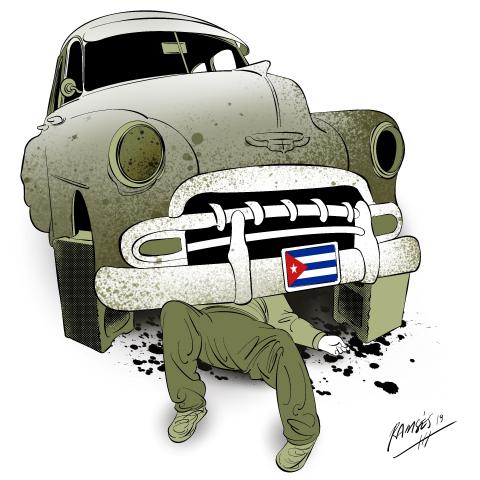
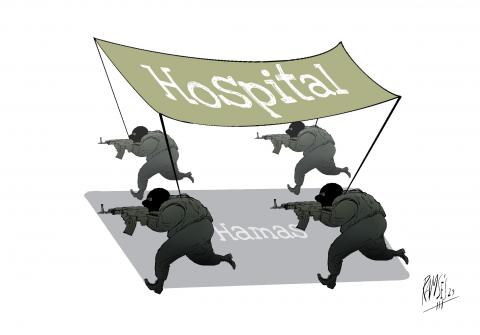
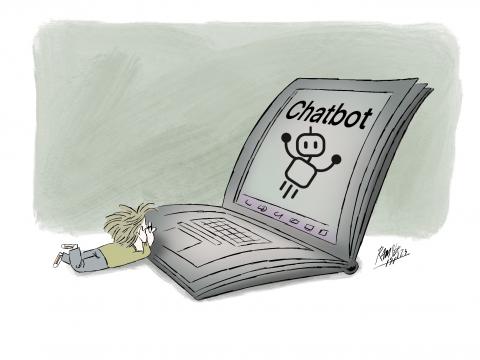
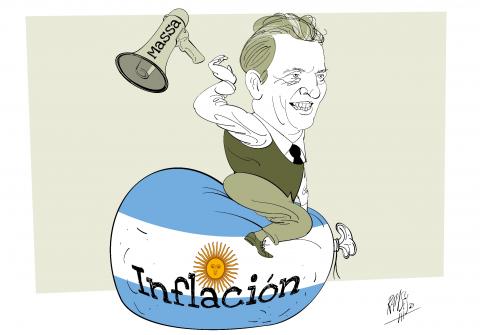
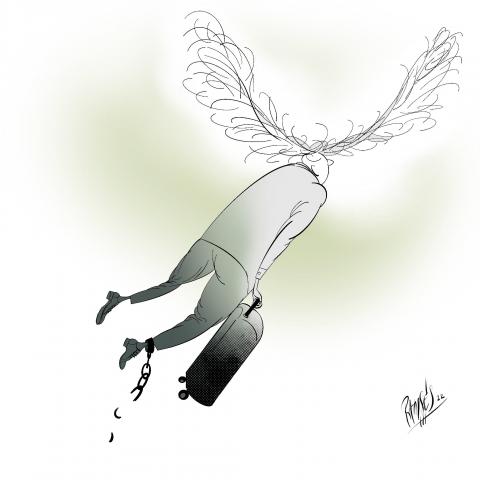
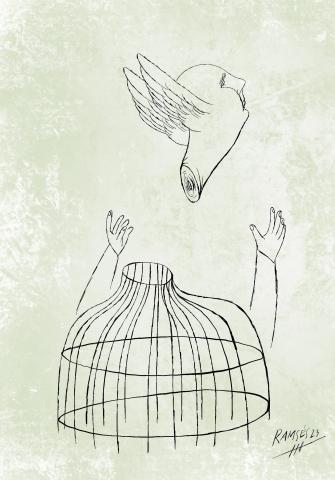
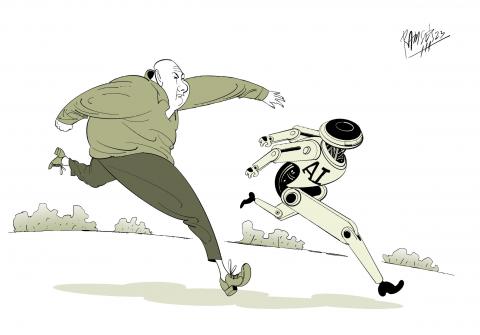
Interview with Ramsés Morales
By Pepe Pelayo
There is nothing sacrosanct that we cannot laugh at
I am going to “dialocate” now with a comedian like me, who is also a countryman (we are Cuban), with someone who is also from the province (he from Sancti Spiritus and I from Matanzas), who also went to live in another country (he to Switzerland and I to Chile). Someone with whom Egyptian history unites me, because he can seem like a Pharaoh and I like a mummy (because of our ages, I say). This is my friend Ramsés Morales. “Sinuhe the Egyptian him, who?” (This is an old joke of mine, which I suppose has also occurred to a thousand other colleagues).
But now seriously, Ramsés Morales was born in 1970 in Trinidad, Cuba. His works have appeared in some important newspapers around the world. He has exhibited in renowned galleries in Europe and the United States. In Cuba he published some drawings in the famous humorous weekly Dedeté (I have followed him since then). It has won international awards such as the important World Press Cartoon in 2019.
I'm a big fan of his work and once interviewed him for this very site a few years ago, so I'll do my best not to repeat the questions...
PP: Thank you for accepting that I interview you again, dear Ramses. I know you work hard and giving me your time, effort and neurons is very valuable to me.
RAMSÉS: Thank you very much, dear Pepe, for interviewing this outsider of Cuban cartoons again.
PP: Well, if so, I would be too. But I prefer to think that even if we have become Swiss or Chilean nationalized, it is impossible to stop being Cuban because that is where we were formed. Anyway, to start, can you introduce yourself better in case some of our followers don't know you? Perhaps also telling us how you would like to be remembered in the distant future.
RAMSES: To begin, I can tell you that I have been a caricaturist since I was a child. Once I discovered the cartoon while leafing through the pages of the New Yorker that my grandfather, a Spanish emigrant, collected. Those magazines were a pleasure for me to see every time I went on vacation to his house in Villa Clara. I think my passion for pure lines began from that moment. They were such simple and elegant drawings at the same time, with a touch of gray here or there... I was so fascinated that I began to copy them until my grandfather asked me what I wanted to be and I answered: publish drawings like those in that magazine. He gave me a wonderful gift, an Esterbrook pen and a notebook and told me: “Well, start now.”
I don't care much about how people remember me, that will come one way or another. Rather, the exercise of editorial caricature that I do daily has made me focus much more on the here now. That's what matters most to me. And get paid for my work.
PP: First of all, we must thank your grandfather then. Then I tell you that it is true that we have to worry about the here and now, but we artists must also think even a little about our legacy. So I think even if you don't think about it consciously, it's there in you. Maybe since you are young, the time has not come to think about that. But let's talk better about your work. Do you think it has evolved from when you started to today? And I am not referring to the product of practice and experience, because it is logical and obvious that almost all of us improve quality over time, but I am referring to an evolution of form, style, and interests in content.
RAMSES: It has evolved a lot, astronomically I could say. Freedom is something incalculable, dear Pepe. You know it. In Cuba I was an outsider, I couldn't make a living from publishing a drawing from Easter to San Juan in “Juventud Rebelde” or in “La Calle del Medio” or in “La Picúa”. Besides, the topics they asked me for didn't provide much. So I opted for the white or environmentalist caricature. In Cuba we have great masters of this type of drawing. They have developed it almost to the point of perfection. But I wanted to say something else. Draw about current events. Provoke a reaction in the reader. Provide my point of view to social frustration... what do I know... That's why I was an outsider.
PP: I saw you in Dedeté and I thought you liked white humor more, then I saw that you publish a lot of political humor and lately I see that you are doing a lot of personal caricatures. Which of all these modalities do you enjoy the most?
RAMSES: Political humor is typical of man. It is neither left nor right. For me, the concept of Politician already has its answer in itself. If we go to the etymology of the word, it means: “What concerns the Polis, what concerns all of us, those who live in Polis.” Everything is politics, from eating to going to the bathroom. I don't know how those who say: “I don't get involved in politics” still don't understand it. No, it's not that you get into politics, it's that you live, breathe, walk, dress politics. That's how I understand it. I don't stop to think if what I draw responds to right-wing or left-wing criteria. I issue my criteria according to what I believe. By the way, the concept of Politics is a Western concept, born in Greece and then taken to superlative levels by Rome. That's where I am. In that sense I do consider myself a Western cartoonist who responds to Western politics.
PP: You are absolutely right, without a doubt. What happens is that people refer to politics as the militancy of an ideology. People don't discriminate if everything is politics, as you say. Hence the political caricature is classified in this case; that is, the one that has the intention of criticizing that current situation, especially of government and authority in general. I also think that humor is neither from the left, nor from the center, nor from the right, but I know who does think that way... You know? I also ask those who make political humor: does humor bring down governments? Like everyone, the logical answer is: “no”; So I ask him, and why are you doing it? And so I get to what interests me, which is knowing his reasons for doing this type of humor. It's your turn now, my friend.
RAMSES: As I told you before. Following the concept of Politics, then I draw for everyone and for everything. I do not seek to overthrow governments, I leave that to others. I speak about what I live and how I live and I express myself in accordance with a tradition that has been around for some years. When the concept is clear to me, I don't put much effort into thinking if what I'm doing is going to overthrow someone. Actually what I think about is the faces of certain people when they see the drawing and that makes me smile. I'm a child having fun. By the way, in ancient Rome the art of caricature was practiced in the form of graffiti and it was a way of “sounding the noise” and making fun of this or that person. Thinking about that is very pleasing to me. I would have been one of those graffiti artists from that Rome.
PP: We would have been friends, because I could be one of the Caesars' jesters, ha, ha. But to close this point of politics. I support comedians who criticize authorities who abuse power, who are authoritarian, who are corrupt, etc. That dignifies their work. However, I see colleagues who, when their political sector comes to power, do not criticize even if their people fall into the same human miseries. I don't like that behavior. I think they disgrace our profession, especially if they are classified as political comedians. There is no specific question here because it is my reflection. But I would like you to comment to know your opinion and then I will complement you based on your words.
RAMSÉS: In this case, Pepe, I understand those people, because we have to live off of something and that something is drawing. It's simple, there are people who do not take sides, they simply live from their work. They are like soldiers of fortune, they chose that path and live from it. I don't criticize him. I simply focus on how to pay my bills with my work, not only as a press cartoonist but as an illustrator, cartoonist... in short. We are still those graffiti artists of ancient Rome.
PP: Maybe I didn't express myself well. Of course you understand when it's just about surviving. For example, in a dictatorship, if you want to eat, you can't criticize the authorities, obviously. And if you do, you risk being censored, imprisoned, or lynched. But I was referring to cartoonists in democracy. For example, I have ideology A and I criticize the government that has ideology B. I even get paid for that. Then ideology A (my ideology) comes to power and even though my government does bad things I don't criticize them, but not because I don't have a job and don't earn money, but I remain silent because it is my ideology, to take care of them, even if they do things wrong. That's what I was telling you, it's embarrassing. But, well, it was a mere reflection... And now a very fashionable topic: what are the limits of humor for you, if there are any?
RAMSES:None, I firmly believe in our right to blaspheme, to let off steam. I think everyone has that right to reply. The replica has no borders. When we raise our cry of discontent we want even God to wake up if he is sleeping. There is nothing sacrosanct that we cannot laugh at, because everything is nothing more than a convention that we have established among ourselves.
PP: Have you ever been politically censored? Economic censorship in some media? Censorship by politically correct fanatics? Are you a lot of self-censorship?
RAMSES: Yes, very much. I experienced it in Cuba, in the form of catcalls, whispers, glances, non-publications and then ostracism. Which I rejoiced about. What doesn't kill you, makes you fat. Here it's simpler, you send a group of drawings to the editor and one is published. They pay you and start again. There is nothing personal.
PP: Okay, but they could also censor you because you criticized something related to one of the sponsors of the media where you work or collaborate, or they could censor you for the fanaticism that some minority groups are implanting with what is “politically incorrect.” In short, there is everything in the Lord's vineyard. But let's move on to theory a little: there is an obvious difference between drawing a vignette without text and another with words and that is that the message can be understood by a person who speaks any language. But do you have other reasons to differentiate them? We know that there are colleagues who defend one more than the other, what do you think?
RAMSES: In that place I learned that a drawing without words can say a world of things to a huge crowd of people from different countries and I decided to delve in that direction. For me, making drawings without words or with words is the same. I have understood that without words I have more scope and the drawings last longer over time. Naturally, the investment of idea, thought and elaboration is greater than a joke based on words. Living in a society that is German-speaking has helped me a lot to focus more on drawing without words. Because in the end, in essence, we are all equal and we laugh more or less at the same things. In the free world you can be here in Switzerland, but tomorrow you are in France and the next day in Italy and then in Spain... This is non-stop learning.
PP: I totally agree. Hey, would you like to do something in humor that you've never done before? Can you know?
RAMSES: For me, drawing is my life, Pepe. I love it, I walk around, I get lost in the forests that surround my house then I end up in the cafe in the little town where I live, I order an espresso, I take out my iPad and draw. They already know me there and as soon as they see me they already know what I'm going to order.
PP: Perfect. You enjoy peace and routine, this is an excellent duo to create. Dear Ramses, would you have liked me to have asked you a question that I didn't ask you? If so, can you answer it now?
RAMSES: In that place I learned that a drawing without words can say a world of things to a huge crowd of people from different countries and I decided to delve in that direction. For me, making drawings without words or with words is the same. I have understood that without words I have more scope and the drawings last longer over time. Naturally, the investment of idea, thought and elaboration is greater than a joke based on words. Living in a society that is German-speaking has helped me a lot to focus more on drawing without words. Because in the end, in essence, we are all equal and we laugh more or less at the same things. In the free world you can be here in Switzerland, but tomorrow you are in France and the next day in Italy and then in Spain... This is non-stop learning.
PP: I totally agree. Hey, would you like to do something in humor that you've never done before? Can you know?
RAMSES: For me, drawing is my life, Pepe. I love it, I walk around, I get lost in the forests that surround my house then I end up in the cafe in the little town where I live, I order an espresso, I take out my iPad and draw. They already know me there and as soon as they see me they already know what I'm going to order.
PP: Perfect. You enjoy peace and routine, this is an excellent duo to create. Dear Ramses, would you have liked me to have asked you a question that I didn't ask you? If so, can you answer it now?
RAMSES: I would have liked you to ask me: What do you draw with? I would have answered you, with what I have on hand at that moment, but especially with the iPad. It is an instrument that I always dreamed of for my life. Something that you always carry with you and that has a million possibilities. For me it is the perfect Tool. I remember my dark days in Cuba, with lack of everything and especially lack of materials to draw. What rescued my passion for drawing was a Samsung Note with an electronic pen included. It was my lifeline, because I didn't have to worry about materials anymore. I started doing my first full digital drawings with that Samsung… I love technology.
PP: Sounds good to me. Many criticize technological advances. For example, the damage that cell phones have done. But phones are neither good nor bad, the misuse that humans make of them is the problem. That's why seeing you enjoy and take advantage of technology in something as noble as creation is very satisfying. Well, to finish, can you say a word to the followers of humorsapiens.com?
RAMSES: To you, I wish you many good things and above all that you do not lose the most sublime pillar of politics: Dialogue. That is, after all, what cartooning is for me. A dialogue, a conversation. Dialogue does not kill, it does not overthrow governments. Dialogue (also invented by the Greeks) is the tool we have to understand each other and not beat each other. There is always time to dialogue, exchange ideas and understand the other.
A big hug for everyone and may the Sapiens Humor continue.
PP: Well, my friend, it was truly a pleasure to do this “dialogue” with you. I hope you didn't have a bad time, neither because of the length, nor because of the heavy questions, nor because of anything. I wish you good health and continued success!!
RAMSES: See you on the networks!
(This text has been translated into English by Google Translate)

